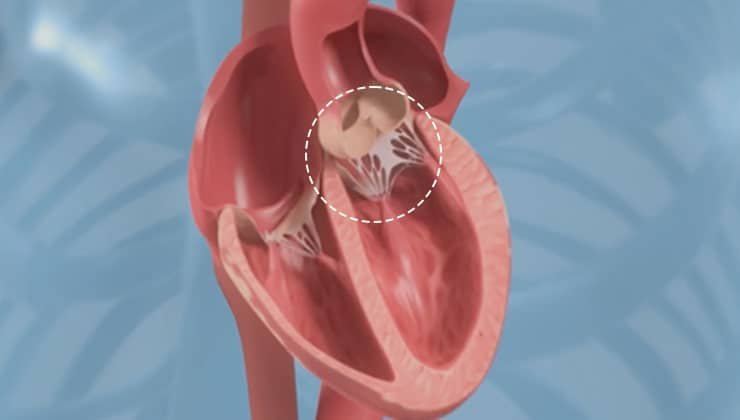Aortic stenosis is a serious cardiac disease that can have an enormous impact on the affected patients’ quality of life and overall health.
Understanding the symptoms, causes, and treatment choices are important for both patients and medical professionals. This article will offer a detailed explanation of aortic stenosis, including its causes, risk factors, and more.
What is Aortic Stenosis?
Aortic stenosis is a heart valve condition defined by the narrowing of the aortic valve, one of the four valves in the heart that regulate blood flow.
The aortic valve directs the flow of oxygen-rich blood from the heart’s left ventricle to the aorta, which transports blood throughout the body. When the aortic valve narrows, it can block blood flow, causing a variety of health concerns.
The most common cause of aortic stenosis is the slow buildup of calcium deposits on the valve leaflets, which causes them to harden and stiffen.
This might be due to age, a congenital cardiac problem, or other medical conditions.
Symptoms Of Aortic Stenosis
The symptoms of aortic stenosis vary according to the severity of the problem. In the early stages, many people may be asymptomatic. As the condition advances, frequent symptoms include:
- Chest discomfort (Angina): This kind of pain is often felt during physical exertion and happens when the heart muscle does not receive enough oxygen-rich blood.
- Shortness of breath: It can occur during effort or even at rest as the illness progresses.
- Fatigue: Reduced blood flow can cause weariness and weakness.
- Dizziness or fainting (Syncope): These symptoms are especially troubling since they may point to a serious blockage of blood flow.
- Heart palpitations: These can develop when the heart struggles to maintain enough circulation.
- Heart murmur: It is a characteristic sound detected using a stethoscope that is frequently one of the earliest signs of valve problems.
Without treatment, aortic stenosis can lead to more serious complications, including heart failure and even sudden cardiac death. The severity of aortic stenosis is typically categorized into three stages:
- Mild: Mild aortic stenosis may not cause noticeable symptoms, but the valve is starting to narrow.
- Moderate: At this stage, symptoms may begin to appear, and the narrowing of the valve is more pronounced.
- Severe: Severe aortic stenosis is a critical condition that often requires prompt treatment. Symptoms are typically more pronounced at this stage.
Causes of Aortic Stenosis
Aortic stenosis can be caused by a variety of causes, including age and lifestyle. The principal causes are:
- Calcification with Age: Calcium deposits can build up on the aortic valve over time, causing it to stiffen and narrow. This is the leading cause among people over the age of 65.
- Congenital Heart Defects: Some people are born with a bicuspid aortic valve (two leaflets instead of three), which might result in early and more severe stenosis.
- Rheumatic Fever: Although less prevalent in wealthy countries, rheumatic fever can scar the aortic valve, resulting in stenosis.
- Radiation Therapy: Years after receiving chest radiation therapy, people may develop valve issues.
Diagnosing Aortic Stenosis
Early detection of aortic stenosis is important for effective treatment. Diagnostic techniques include:
- Physical examination: A doctor may discover a cardiac murmur that indicates aortic stenosis.
- Echocardiogram: This ultrasound test produces precise pictures of the heart and can determine the severity of valve constriction.
- Electrocardiogram (ECG): This test measures electrical activity in the heart and can detect symptoms of heart strain.
- Chest X-ray: An X-ray can reveal the size and structure of the heart as well as calcium deposits in the valve.
- Cardiac catheterization: This invasive examination can reveal extensive information about the blood flow and pressures in the heart.
Treatment for Aortic Stenosis
Treatment options for aortic stenosis depend on the severity of the condition and the patient’s overall health. Common treatments include:
Medications can help manage symptoms and improve heart function, but they do not treat the valve narrowing itself.
Aortic valve replacement is the gold standard treatment for severe aortic stenosis.
There are 3 different ways to achieve this, so make sure you consult someone with experience in all 3 to give you an unbiased recommendation.
Dr. Nikhil
Open Surgery:– The narrowed valve is surgically removed and replaced with a mechanical or biological valve.
Minimally invasive Surgery (MICS):– The narrowed valve is surgically removed and replaced with a mechanical or biological valve via a small incision.
Incisionless or Transcatheter aortic valve replacement (TAVR):– TAVR involves replacing the aortic valve using a catheter inserted through a blood vessel, typically in the groin.
Early diagnosis and management of aortic stenosis are crucial for preventing complications and improving the quality of life for affected individuals. Regular check-ups are essential for monitoring the progression of the condition and determining the appropriate treatment plan.
Lifestyle adjustments
Patients with aortic stenosis might benefit from lifestyle adjustments that promote heart health, including:
- Regular Exercise: While excessive activity should be avoided, moderate exercise might benefit cardiovascular health.
- Healthy Diet: A diet reduced in saturated fat, cholesterol, and salt can help control blood pressure and cholesterol.
- Quitting smoking: It can dramatically improve your cardiovascular health.
- Managing Stress: Meditation, yoga, and deep breathing exercises can all help.
Aortic stenosis is a serious but manageable condition. Individuals with aortic stenosis can live fulfilled lives if diagnosed early and treated appropriately. Advances in medical technology and surgical procedures continue to improve the future prospects for people with this disease. Patients who understand the symptoms, causes, and treatment choices may take an active part in maintaining their health and work together with their healthcare professionals to get the best results.
Schedule your consultation today for TAVR/TMVR and other treatments for Cardiac care at Heart360 Care. Our expert Dr. Nikhil P.J.Theckumparampil is a Gold medalist in MBBS with 17 years of experience in the U.S.


